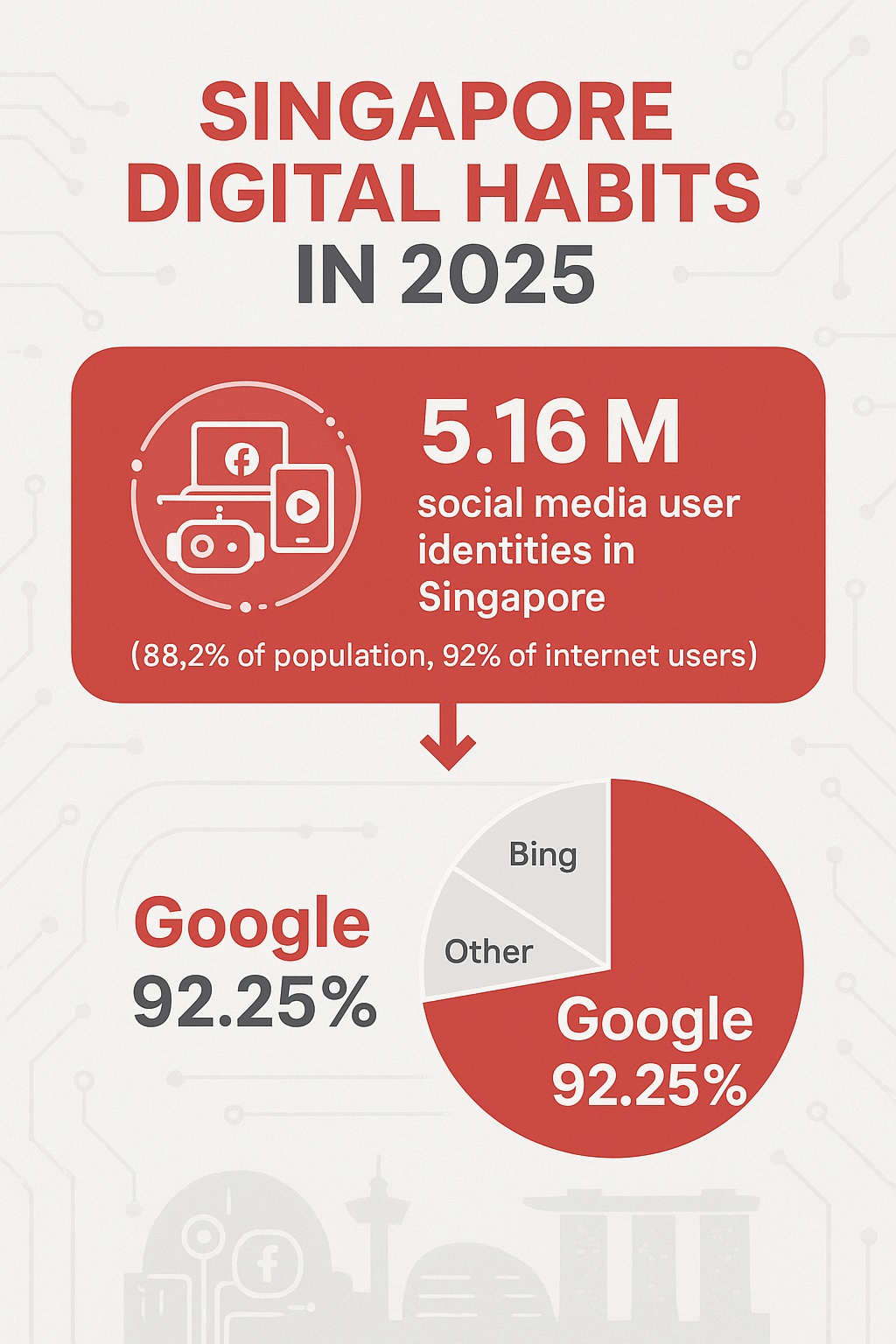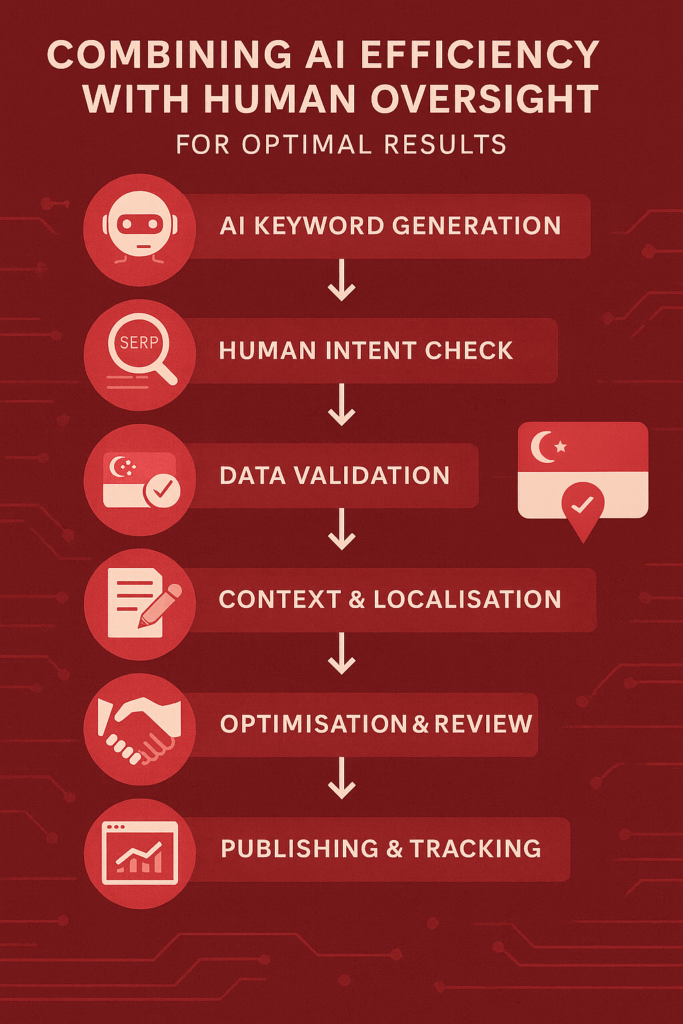Ever wished you could boost your website’s ranking without slogging through an endless list of keywords? AI keyword research tools are a game-saver for busy Singapore business owners searching for ways to outshine competitors in the cutthroat online market. But here’s the thing: relying on AI without a clear plan can backfire, leaving you with keywords that miss the mark or content that flops. In this guide, we’ll uncover the most common AI keyword research mistakes. Then, we will follow with 10 simple solutions from our experience in professional AI SEO services in Singapore that will ensure your strategy drives real results.
1) Misinterpreting User Intent
Choosing “great” keywords does not always pull sales, and there’s a reason for this. A small AI keyword research mistake might lead you to pick terms that sound good but miss what Singaporeans are searching for. Take “best laptop” – it might draw people browsing for ideas, not buying. Meanwhile, “buy gaming laptop Singapore” is what customers who are ready to buy type. Unfortunately, many local shops lose out because their AI tool failed to identify this difference, leaving them stuck on page five of Google.
Fix It: Peek at Google’s search results to crack the code on user intent. If “best laptop” shows blog posts comparing models, write a detailed guide. If “buy gaming laptop Singapore” pulls up product pages, create a slick e-commerce listing. For a detailed approach to identifying the right keywords for your market, read our guide on AI keyword research in Singapore.
2) Generating Ideas Without Data
Sometimes, content writers pour hours into blog posts that try to rank for keywords like “artisan coffee beans Singapore,” only to find out nobody’s searching for it. That’s one of the most common AI keyword research mistakes – leaning on AI tools that spit out ideas without solid data on search volume or competition. Most Singapore startups waste time on niche keywords like “gourmet coffee blends” when “best coffee delivery Singapore” would’ve brought in real customers. It’s like setting up a pop-up stall in an empty alley.
Fix It: Let AI spark your ideas, but double-check them with tools like Google Keyword Planner or Ahrefs. Look for keywords with decent searches – say, 500 monthly hits – but not so cutthroat that you’re battling Shopee or Lazada.
3) Ignoring Contextual Relevance
Imagine running a cosy café in Tampines and your AI tool suggests “best coffee shop Tokyo.” Grabbing keywords that don’t match your business or Singapore’s market is a rookie AI keyword mistake. Many local brands miss out on the opportunity to attract local clients using unsuitable terms like “gourmet espresso” when their customers are searching “kopi places near Jurong.” Irrelevant keywords waste your time and make your site feel like it’s speaking the wrong language.
Fix It: Tell your AI exactly what you need – say, “keywords for a Singapore café” or “terms for HDB renovation services.” Then, sift through its suggestions like you’re picking durians: keep only the ones that fit. For example, swap “gourmet espresso” for “best kopi in Tampines.”
4) Overlooking Emerging Trends

Singapore’s market moves at lightning speed – yesterday it was “at-home ramen kits,” today it’s “Hari Raya gift hampers 2025.” One of the major AI keyword research mistakes is relying on AI tools that pull from old data, missing these red-hot trends. Imagine your AI suggesting “bubble tea” while your competitors are ranking for “matcha dessert boxes Singapore” because they caught the latest craze. Without fresh keywords, you’re handing the spotlight to others, effectively missing out on the latest AI SEO trends.
Singapore’s digital market is highly connected: 88.2% of the population – or 92.4% of all internet users – are active on social media, making trend signals abundant and rapid. Ignoring them means missing opportunities that your AI model may not yet reflect.
Fix It: Treat AI like a trusty sidekick, not the boss. Pop into Google Trends to spot rising searches, like “eco-friendly mooncakes”, before the Mid-Autumn Festival. Skim TikTok or Instagram for what’s trending in Singapore and try out some voice search optimisation strategies.
5) Focusing Solely on High-Volume Keywords
It’s tempting to go after keywords like “coffee” or “shoes” because your AI tool says they get thousands of searches. But here’s the problem: these broad terms are like trying to win a shouting match with global brands in Singapore’s crowded market. A big AI keyword research mistake is focusing only on high-volume keywords, which often attract curious browsers, not buyers. Fun fact: nearly 60% of Google searches end without a click, so those “popular” keywords might just waste your time.
Fix It: Blend big keywords with specific, long-tail ones. For example, instead of “coffee,” target “best speciality coffee roasters in Jurong.” These phrases face less competition and pull in customers ready to act.
6) Forgetting SERP Intent & Content Type
Imagine you’ve found the perfect keyword, like “best yoga studios Singapore,” but your AI tool doesn’t tell you that Google’s top results are all videos or studio directories. If you write a blog post instead, you’re fighting a losing battle. This AI keyword research mistake usually involves forgetting to check the type of content that ranks – whether it’s videos, product pages, or guides. Mismatched content means your page might never see the light of Google’s first page.
Fix It: Before creating content, search your keyword on Google. If “how to bake pandan cake” shows mostly YouTube tutorials, whip up a quick video. If “Singapore financial advisors” pulls up detailed guides, write a comprehensive one.
7) Keyword Cannibalisation
Picture this: you’ve got two blog posts on your site, both targeting “affordable coworking spaces Singapore.” Instead of dominating Google, they’re stealing clicks from each other, leaving search engines scratching their heads. This AI keyword research mistake, called keyword cannibalisation, happens when multiple pages go after the same or similar keywords, diluting your SEO power. It’s like hosting two pop-up shops in Singapore selling the same thing—neither wins.
Fix It: Give each keyword its own spotlight. Pick one page for “affordable coworking spaces Singapore” and make it the best. If you’ve got duplicate pages, merge them into a single, awesome one or tweak them to target distinct keywords, like “coworking spaces for startups Singapore.” At The Leading Solution, we audit sites to identify and resolve these conflicts and streamline your SEO strategy.
8) Assuming AI Has Real-Time Data
Sometimes, betting on an AI tool to tell you the latest search trends in Singapore is not the best idea. Artificial intelligence often lags in terms of real-time data, providing users with outdated results. This AI keyword research mistake is based on the assumption that AI has a crystal ball, making local businesses chase keywords like “CNY decorations 2024” in March, when everyone’s moved on to “Hari Raya recipes.” AI often guesses search volumes, and those wrong numbers can send you down a rabbit hole, like planning a Durian Day sale when nobody’s looking.
Fix It: Always feed AI fresh data from tools like Google Search Console, which shows what your Singapore customers are actually searching for. Ask AI to sort and group those keywords – like bundling “best HDB renovation deals” with “affordable interior designers Singapore” – instead of inventing stats. Using AI search optimisation tips for SMEs will help you adapt your strategy dynamically and keep your content accurate and updated.
9) Over-Optimising Keywords / Stuffing
Ever stumbled across a website that shoves “best bubble tea Singapore” into every sentence until you want to scream? Keyword stuffing is one of the classic AI keyword research mistakes that makes your content read like a robot wrote it. In Singapore’s fast-moving market, many businesses cram keywords, ultimately ruining the experience. Worst of all, Google’s smart enough to spot this, and it’ll push your site down the rankings. In simple terms, your readers want helpful content, not a keyword soup.
Fix It: Use your main keyword sparingly, like a dash of soya sauce on Hainanese chicken. For “best bubble tea Singapore,” toss in natural phrases like “top boba spots in Bugis” or “where to find creamy milk tea nearby.” Write for your customers first – make it fun to read, like a chat at a kopitiam. Also, ensure you have compliant AI SEO content to maintain quality and transparency.
10) Relying Solely on AI Without Human Oversight

AI tools are like those dazzling stalls at a Singapore pasar malam – full of tempting ideas, but not everything’s a gem. A huge AI keyword research mistake is trusting artificial intelligence to churn out keywords or content without a human to keep it in check. While this sounds straightforward and tempting, aiming for “healthy bread” when Singaporeans are searching for “artisan sourdough delivery Bedok” can turn into a catastrophe. Without a human eye, you might end up with off-brand keywords or spammy content that Google flags faster than a queue forms for kaya toast at Ya Kun.
Fix It: Treat AI like a bright intern with big ideas – with some advanced AI SEO strategies, it can help you reach the top! Review every keyword suggestion to ensure it fits your business. Check customer reviews on Google Maps or Shopee to see what locals are saying. Additionally, you can use tools like Google Keyword Planner to confirm search volumes. Incorporate conducting AI content gap analysis to further improve your efficiency when identifying and correcting mismatches in your keyword strategy.
Final Words on Mistakes when Doing AI Keyword Research
AI keyword research can be a powerful tool for saving time and finding new opportunities. However, skipping basic oversight can easily result in wasted resources and missed customers. The golden mean is to blend AI insights with human review. That way, you can create content that is relevant, accurate, and more likely to rank in Singapore’s search results.
Prevent AI Keyword Research Mistakes with The Leading Solution
Ready to use AI keyword research the right way? Work with The Leading Solution to get expert guidance and proven AI SEO strategies for your business.


